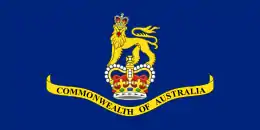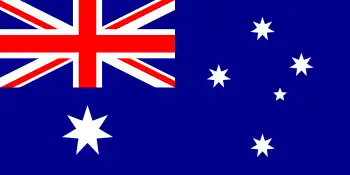List of governors-general of Australia
The Governor-General of Australia is the head of the executive branch of the federal government, serving as the representative of the Australian monarch (currently Elizabeth II). The position came into being with the adoption of the new national constitution on 1 January 1901, and has been held by 27 people since then. Governors-general have no fixed term, but have usually served for around five years.
| Governor-General of Australia | |
|---|---|
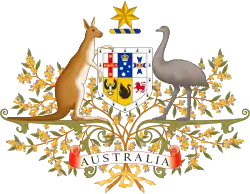 | |
 | |
Background
For the first two decades after federation, governors-general were selected solely by the British Government. The monarch was consulted on the decision into the 1930s. The first four governors-general were peers; Sir Ronald Munro Ferguson (appointed 1914) was the first commoner to hold the position, although he was also later elevated to the peerage. In 1920, Billy Hughes became the first Prime Minister to be consulted over the governor-generalship. Stanley Bruce (1925) and Joseph Lyons (1935) either asked for or were given a list of suitable candidates to choose from.
James Scullin (1930) became the first Prime Minister of Australia to exercise complete discretion in the appointment; his nomination of Sir Isaac Isaacs made Australia the first Dominion to have a native-born governor-general. In 1945, John Curtin nominated Prince Henry, Duke of Gloucester, to the post – the first and only royal officeholder. A second Australian (William McKell) was appointed in 1947; he was followed by three more Britons, each chosen by Sir Robert Menzies. Menzies's fourth nomination was Richard Casey, who took office in 1965; he and all subsequent governors-general have been Australian citizens. All states except South Australia and Tasmania have provided at least one appointee. The first female governor-general, Quentin Bryce, took office in 2008.
On 16 December 2018, prime minister Scott Morrison announced that the next Governor-General would be General David Hurley, then-governor of New South Wales. To provide continuity through general elections both federally and in New South Wales, Hurley succeeded General Sir Peter Cosgrove, who had planned to retire in March 2019, on 1 July 2019.[1][2]
List
| No. | Portrait | Governor-General | Term of office | Occupation | Monarch(s) | Prime Minister(s) | ||
|---|---|---|---|---|---|---|---|---|
| Took Office | Left Office | Time in Office | ||||||
| 1 | 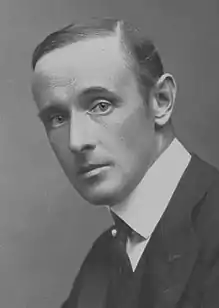 |
John Hope, Earl of Hopetoun | 1 January 1901 | 17 July 1902[lower-alpha 1] | 1 year, 197 days | Statesman, aristocrat | Victoria (1837–1901) |
Barton |
| Edward VII (1901–1910) | ||||||||
| 2 |  |
Hallam Tennyson, Baron Tennyson | 9 January 1903 | 21 January 1904 | 1 year, 12 days | Aristocrat | ||
| Deakin | ||||||||
| 3 |  |
Henry Northcote, Baron Northcote | 21 January 1904 | 9 September 1908 | 4 years, 232 days | Politician | ||
| Watson | ||||||||
| Reid | ||||||||
| Deakin | ||||||||
| 4 | 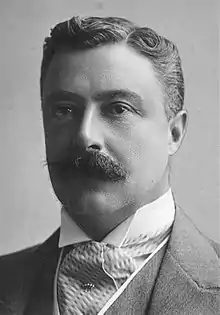 |
William Ward, Earl of Dudley | 9 September 1908 | 31 July 1911 | 2 years, 325 days | Aristocrat, military officer, politician | ||
| Fisher | ||||||||
| Deakin | ||||||||
| Fisher | ||||||||
| George V (1910–1936) | ||||||||
| 5 | 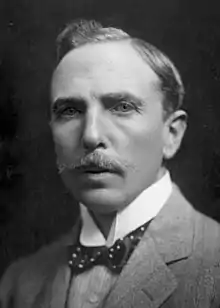 |
Thomas Denman, Baron Denman | 31 July 1911 | 18 May 1914 | 2 years, 291 days | Aristocrat, politician | ||
| Cook | ||||||||
| 6 | .jpg.webp) |
Sir Ronald Munro Ferguson | 18 May 1914 | 6 October 1920 | 6 years, 141 days | Politician | ||
| Fisher | ||||||||
| Hughes | ||||||||
| 7 | 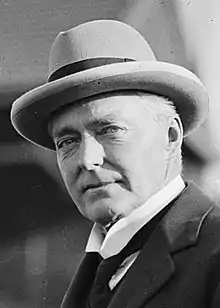 |
Henry Forster, Baron Forster | 6 October 1920 | 8 October 1925 | 5 years, 2 days | Politician | ||
| Bruce | ||||||||
| 8 | 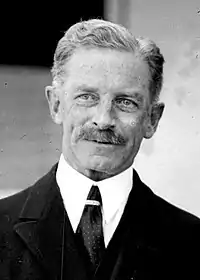 |
John Baird, Baron Stonehaven | 8 October 1925 | 2 October 1930[lower-alpha 2] | 4 years, 359 days | Politician | ||
| Scullin | ||||||||
| 9 |  |
Sir Isaac Isaacs | 21 January 1931 | 23 January 1936 | 5 years, 2 days | Lawyer, politician, judge | ||
| Lyons | ||||||||
| Edward VIII (1936) | ||||||||
| 10 |  |
Alexander Hore-Ruthven, Baron Gowrie | 23 January 1936 | 30 January 1945 | 9 years, 7 days | Army officer | ||
| George VI (1936–1952) | ||||||||
| Page | ||||||||
| Menzies | ||||||||
| Fadden | ||||||||
| Curtin | ||||||||
| 11 | 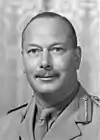 |
Prince Henry, Duke of Gloucester | 30 January 1945 | 11 March 1947 | 2 years, 40 days | Prince, military officer | ||
| Forde | ||||||||
| Chifley | ||||||||
| 12 | 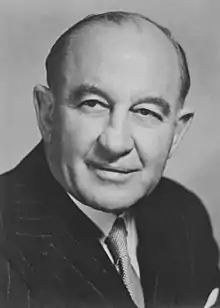 |
Sir William McKell | 11 March 1947 | 8 May 1953 | 6 years, 58 days | Politician | ||
| Menzies | ||||||||
| Elizabeth II (1952–present) | ||||||||
| 13 | 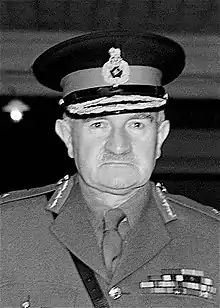 |
Sir William Slim | 8 May 1953 | 2 February 1960 | 6 years, 270 days | Military commander | ||
| 14 | 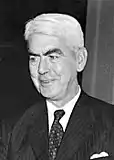 |
William Morrison, Viscount Dunrossil | 2 February 1960 | 3 February 1961[lower-alpha 3] | 1 year, 1 day | Politician | ||
| 15 | 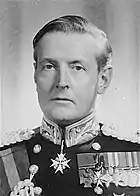 |
William Sidney, Viscount De L'Isle | 3 August 1961 | 7 May 1965 | 3 years, 277 days | Army officer, politician | ||
| 16 | 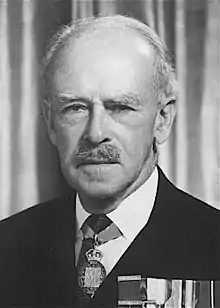 |
Richard Casey, Baron Casey | 7 May 1965 | 30 April 1969 | 3 years, 358 days | Statesman | ||
| Holt | ||||||||
| McEwen | ||||||||
| Gorton | ||||||||
| 17 |  |
Sir Paul Hasluck | 30 April 1969 | 11 July 1974 | 5 years, 72 days | Statesman | ||
| McMahon | ||||||||
| Whitlam | ||||||||
| 18 | 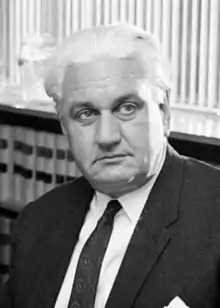 |
Sir John Kerr | 11 July 1974 | 8 December 1977 | 3 years, 150 days | Lawyer, judge | ||
| Fraser | ||||||||
| 19 | 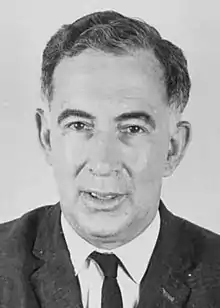 |
Sir Zelman Cowen | 8 December 1977 | 29 July 1982 | 4 years, 233 days | Academic | ||
| 20 | 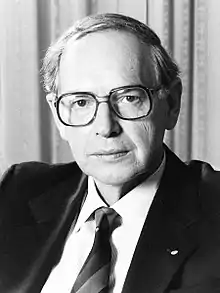 |
Sir Ninian Stephen | 29 July 1982 | 16 February 1989 | 6 years, 202 days | Barrister, judge | ||
| Hawke | ||||||||
| 21 | 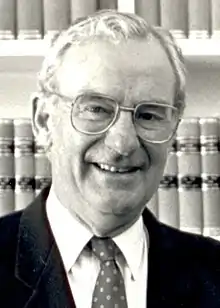 |
Bill Hayden | 16 February 1989 | 16 February 1996 | 7 years, 0 days | Politician | ||
| Keating | ||||||||
| 22 | 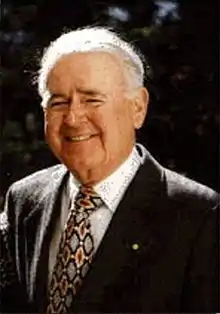 |
Sir William Deane | 16 February 1996 | 29 June 2001 | 5 years, 133 days | Lawyer, judge | ||
| Howard | ||||||||
| 23 | 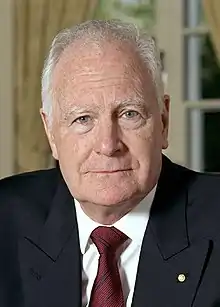 |
Peter Hollingworth | 29 June 2001 | 28 May 2003[lower-alpha 4] | 1 year, 333 days | Anglican bishop | ||
| 24 | 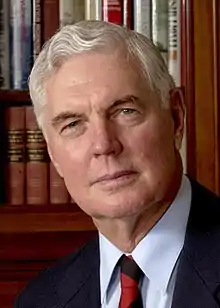 |
Michael Jeffery | 11 August 2003 | 5 September 2008 | 5 years, 25 days | Army officer | ||
| Rudd | ||||||||
| 25 | .jpg.webp) |
Dame Quentin Bryce | 5 September 2008 | 28 March 2014 | 5 years, 204 days | Academic | ||
| Gillard | ||||||||
| Rudd | ||||||||
| Abbott | ||||||||
| 26 | _crop.jpg.webp) |
Sir Peter Cosgrove | 28 March 2014 | 1 July 2019 | 5 years, 95 days | Military officer | ||
| Turnbull | ||||||||
| Morrison | ||||||||
| 27 | .jpg.webp) |
David Hurley | 1 July 2019 | incumbent | 1 year, 209 days | Military officer | ||
See also
- History of Australia
- Constitutional history of Australia
- Governors of the Australian states
- British Empire
- Governor-general (links to other countries which have governors-general)
Notes
- Hopetoun left for England on 17 July 1902. Lord Tennyson, the Governor of South Australia, was appointed Administrator of the Government until formally taking over the governor-generalship on 9 January 1903.
- Stonehaven left for England on 2 October 1930. Lord Somers, the Governor of Victoria, was appointed Administrator of the Government until Sir Isaac Isaacs took over the governor-generalship on 21 January 1931.
- Dunrossil died in office on 3 February 1961. Sir Dallas Brooks, the Governor of Victoria, was appointed Administrator of the Government until Lord De L'Isle took over the governor-generalship on 3 August 1961.
- Hollingworth resigned on 28 May 2003. Sir Guy Green, the Governor of Tasmania, was appointed Administrator of the Government until Michael Jeffery took over the governor-generalship on 11 August 2003.
- "Australia's New Governor-General". Prime Minister of Australia. 16 December 2018. Retrieved 16 December 2018.
- Karp, Paul; Cox, Lisa (16 December 2018). "David Hurley named next governor general of Australia". The Guardian. Retrieved 16 December 2018.
Further reading
External links
- The Office of the Governor-General
- The use of the reserve powers
- A Mirror to the People a 58-minute documentary film on the Office of Governor-General of Australia 1999. Dir: Daryl Dellora. Features Sir William Deane, Sir Zelman Cowen, Sir Ninian Stephen. Special Commendation ATOM Awards.
